by Evan Randolph
The
Return of Athena--- reclaiming our universal protectress
 The Athena statue in the Parthenon was mammoth-
The Athena statue in the Parthenon was mammoth-
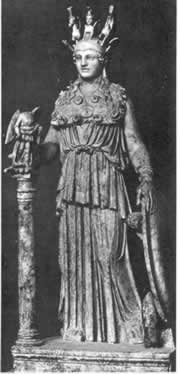
Athena Parthenos, Greek goddess of Wisdom. (Parthenos
means Virgin). This statue reproduces, with a slight variation in
posture, the celebrated Athena Parthenos by Phidias in the Parthenon.
The huge statue, approx. 42 feet tall, dominated the interior
of the Parthenon in Athens, Greece. She held a shield upright
with a snake coiled within it; the other hand held a Nike (Victory).
Phidias' massive statue of Athena stood in the Parthenon 438 BCE until
429 CE, a total of 867 years.The reproduction above is 2nd
century CE. Athens Museum. New Larousse Encyclopedia
of Mythology, p. 107
Athena's dress was covered in gold,
the value of which in today's dollars would be $12,000,000.
(see Footnote 1)
 Here
is a full sized reproduction of Athena-
Here
is a full sized reproduction of Athena-
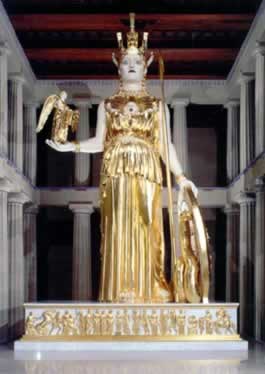
This
full-scale replica of Athena Parthenos, Greek goddess of Wisdom,
is 41 feet 10 inches tall and weighs 12 tons. The goddess of
victory (Nike) in Athena's right hand is 6 feet 4 inches tall. (see
Footnote 2 ref Athena statue)
Located in Nashville, TN, Athena Parthenos is the centerpiece of a
full scale replica of the ancient Parthenon.
(see Footnote 3 ref Parthenon, Nashville)
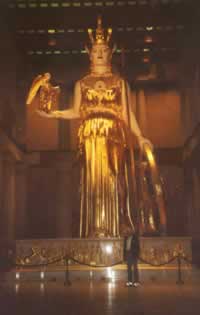
Here is Evan Randolph
(lower right) standing in front of 42 foot statue of Athena
in the Parthenon, Nashville. Note how Evan's Nike sneakers lit up
for the occasion.
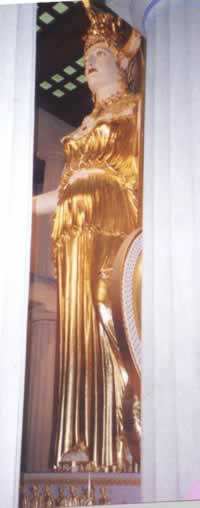
42 foot Athena
as seen from the side between the pillars of the Parthenon, Nashville.
 IN
ANCIENT GREECE- ATHENA, GODDESS OF WISDOM, WAS WELL KNOWN-
IN
ANCIENT GREECE- ATHENA, GODDESS OF WISDOM, WAS WELL KNOWN-
 Plato
(429-348 BCE) states that the Goddess Athena is both "...a
lover of war and a lover of wisdom..." (see Plato Timaeus
24d- footnote 4).
Plato
(429-348 BCE) states that the Goddess Athena is both "...a
lover of war and a lover of wisdom..." (see Plato Timaeus
24d- footnote 4).
Plato Cratylus 407a-b - "The ancients seem to have had
the same belief about Athena as the interpreters of Homer
have now; for most of these, in commenting on the poet, say that he
represents Athena as mind (nous) and intellect (dianoia); and
the maker of names seems to have had a similar conception of her,
and indeed he gives her the still higher title of "divine
intelligence" (hê theou noêsis), seeming to
say: This is she who has the mind of God (Theonoa)..."
(see footnote 4)
Plato wrote about wisdom in a female
context; she can be found in all her purity in the other world, where
the souls go after death. (Plato, Phaedo, The Harvard Classics
1909, p. 57)
 800 BC- The
Greek goddess of Wisdom Athena appeared 162 times in HOMER'S
ODYSSEY. She came down from heaven and provided significant help
to Odysseus in his earthly travails. (see footnote 5)
800 BC- The
Greek goddess of Wisdom Athena appeared 162 times in HOMER'S
ODYSSEY. She came down from heaven and provided significant help
to Odysseus in his earthly travails. (see footnote 5)
It is interesting that Athena & Odysseus planned the recovery
of Odysseus's wife and home on Apollo's grand festal day (Odyssey
20:307). This change around of Odysseus's fortunes, long in decline
and now on the upswing, occured at the Winter Solstice, then December
25th--Apollo's festal day! (see Footnote 6).
Apollo was a sun god, a healer-god, the god of divination and
prophecy, shepherd-god, in addition to archer-god
(New Larousse Encyclopedia of Mythology- pg 113) and was born on December
25th, the winter solstice.
 Why was Athena so special?
Why was Athena so special?
She
helped to create mankind- "Prometheus is holding
a man whom he created; Athena breathes soul into him in the form of
a butterfly." Sarcophagos 270 AD, Musee Capitolina--see footnote
7
9000 BC-
She founded Greece.--- 1,000 years later, she
founded Egypt- Plato Timeaeus 23d--see
footnote 8
Protector of Cities- Athens (footnote
9), Constantinople (footnote 10),
Rome (footnote 11)
Intercessor between God the Father & man-
Athena asks Zeus to help Odysseus: "Olympian Zeus, have you no
care for him in your lofty heart?" Odyssey 1: 72.
Athena appeals to Zeus on behalf of Odysseus: "Father, son of
Cronus, our high and mighty king, now let me ask you a question...tell
me the secrets hidden in your mind." Odyssey 24: 522
She helps & protects you- Athena to Odysseus:
"Surely I'll stand beside you, not forget you, not when the day
arrives for us to do our work." Odyssey 13: 449
Athena & Odysseus discuss tactics/strategy-
"Then down they sat by the sacred olive's trunk to plot the death
of the high and mighty suitors. The bright eyed goddess Athena led
the way..." Odyssey 13: 426
She grants glory- Nestor to Athena:
"Now, O Queen, be gracious! Give us high renown..." Odyssey
3: 425
Odysseus planning against Cyclops: "would Athena give me glory?"
Odyssey 9: 355
Her mind knows all things- Odysseus
to Athena: "You know it all." Odyssey 13: 475
She loves you- Nestor to Telemachus:
"If only the bright-eyed goddess chose to love you just as she
lavished care on brave Odysseus...I've never seen the immortals show
so much affection as Pallas openly showed him..." Odyssey
3: 247
She has
power- Phantom (Athena) to Penelope: "She has
power- Pallas Athena." Odyssey 4: 931. Odysseus wins fight:
"thanks to Athena's superhuman power." Odyssey 8:
584
She provides immortality-
Athena gifted Diomede with immortality---- (see footnote 12)
"Dionysos is then reborn due to Athena---" (see footnote
13)
 And what happened to Athena?
And what happened to Athena?
Statement 1
 Athena written into Jewish Wisdom texts-
Athena written into Jewish Wisdom texts-
We know Plato
(429-347 BC), a student of Socrates, developed the idea that Athena
was the nous, or mind of God. Homer is mentioned
in this connection. (Plato Cractylus 407a-b- see footnote 4).
Plato states that the Goddess Athena is both "...a
lover of war and a lover of wisdom..."
(see Plato Timaeus 24d footnote 4).
Plato wrote about wisdom in a female
context, she can be found in all her purity in the other world, where
the souls go after death. (Plato, Phaedo, The Harvard Classics,
p. 57)
Plato mentions the immortality of the soul,
which separates from the body after death. (Plato, Phaedo,
p. 111)
Plato quotes Homer (Odyssey) in three places in his
Phaedo, showing his respect for the poet.
Jewish-Hellenic Biblical writers in 100
BC wrote the Wisdom texts in Greek in
Alexandria, these include Proverbs and the apocraphal book
Wisdom of Solomon. These writers sought to fuse Greek allegory
into Jewish Old Testament texts.
The Jewish-Hellenic Biblical writers admired the ideas of Plato
& Homer. They incorporated Plato's concept of the soul
into the wisdom texts (Wis 3: 1-19). This thinking was foreign to
the Old Testament and the Jewish resurrection of the body (Dan. 12.2).
They appropriated many of Athena's attributes outlined
in the Odyssey (or elsewhere) and labelled them as Divine Wisdom--here
are examples (compare to Athena's attibutes above):
She
helped to create mankind- "...when
he prescribed its limits for the sea and knit together earth's foundations.
Then I was at his side each day, his darling and delight, playing
in his presence continually, playing on the earth, when he had finished
it, while my delight was in mankind." Proverbs 8:29-31
Intercessor between God the Father & man-
"...who ever learnt to know thy purposes, unless thou hadst given
him wisdom and sent thy holy spirit down from heaven on high? Thus
it was that those on earth were set upon the right path, and men were
taught what pleases thee; thus they were preserved by wisdom."
Wisdom 9: 17- 18
She helps & protects you- "Through me kings
are sovereign and governors make just laws. Through me princes act
like princes, from me all rulers on earth derive their nobility."
Proverbs 8:15-16
"Wisdom it was who kept guard over the first father of the human
race, when he alone had yet been made..." Wisdom 10:1
Divine Wisdom adept at tactics/strategy-
"Wisdom prevails over strength, knowledge over brute force; for
wars are won by skillful strategy, and victory is the fruit of long
planning." Proverbs 24: 5-6
She grants glory- "In my
hands are riches and honour..." Proverbs 8:18
Her mind knows all things- "For
she knows and understands all things..." Wisdom 9:11
She loves you- "Those
who love me I love...." Proverbs 8:17
She has
power- "I have force, I have ability; understanding
and power are mine." Proverbs 8: 14
She provides immortality-
"Through her I shall have immortality,---" Wisdom 8:13
"in kinship with wisdom lies immortality---" Wisdom 8:17
[NEW DATA]-- Jewish-Hellenic
Biblical writers incorporated Homer's Odyssey directly into
the Wisdom of Solomon 4:10 - 5:22 (in
the Septuagint)
Athena, Greek goddess of wisdom,
who played such a key role in saving Odysseus in the Odyssey,
now reappears as Divine Wisdom in the Jewish-Hellenic Wisdom texts.
Click for supporting documentation--[THIS
IS A NEW FINDING- NOT LISTED ON GOOGLE]
CONLUSION REF WISDOM TEXTS:
JEWISH-HELLENIC DIVINE WISDOM = ATHENA, GREEK GODDESS
OF WISDOM
Statement 2
 Despite
misogynist leanings, Paul of Tarsus 50 CE incorporates Wisdom into
the Christian story-
Despite
misogynist leanings, Paul of Tarsus 50 CE incorporates Wisdom into
the Christian story-
[ I suspect Paul was
aware of Homer's
Odyssey (700 BC), Plato's
Phaedo (325 BC), & the Jewish-Hellenic Wisdom texts (100
BC). Paul quotes from the 3rd century BC Hellenistic poet Aratus when
speaking in Athens
(Acts 17:28).
Among other works, Aratus had written an edition of Homer's ODYSSEY---see
Footnote 14. Therefore Paul was well aware of Athena's contributions
in restoring Odysseus' fortunes in Homer's ODYSSEY.]
Paul of Tarsus 50 CE had a problem
with the feminine-
He stated "As in all congregations of God's people, women
should not address the meeting. They have no licence to speak, ..."
(1 Cor 14:34)
"It is a shocking thing that a woman should address the congregation."
(1 Cor 14:35)
"It is a good thing for a man to have nothing to do with women:..."
(1 Cor 7:1)
Paul attacks idols in a trip 50 CE trip to Athens
where the massive gold statue of Athena in the Parthenon could be
seen from miles away. "He was exasperated to see how
the city was full of idols." (Acts 17:16) --See Footnote
15.
Paul seems to attack Athena directly when he states to the Athenians
"...we ought not to suppose that the deity is like an image
in gold or silver or stone, shaped by human craftsmanship and
design." (Acts 17:29)
Paul referred to "those dumb heathen gods,..." (1
Cor 12:2)
[Editors note--not many years later, and to this day, Catholic
Churches are full of statues of Jesus & Mary.]
Paul in 50 CE reassigns Greek Wisdom
(who our research shows was Athena) to Christ-
First, he mentions "...God's hidden wisdom..." (1
Corinthians 2:7). I suspect Paul wishes to be unclear about the identity
of hidden wisdom, particularly as a divine feminine entity.
Paul tells us that wisdom is a Greek, not a Jewish phenomenon: "...Jews
call for miracles, Greeks look for wisdom..."
(1 Corinthians 1:23).
Concerning Jesus Christ, Paul states: "...God has made
him our wisdom..." (1 Corinthians 1:30). "...he is
the power of God and the wisdom of God..." (1 Corinthians
1:24)
OUR wisdom suggests that for Christians, Christ is now "our"
wisdom.
However, as of Paul's writing, the Greek goddess of wisdom Athena
still stood in the Parthenon.
Paul uses Plato's ideas to describe
life after death- Plato in his Phaedo
(325 BC) shows the soul to be immortal and separates
from the body at death.
Paul copies this theme "sown as an animal body, it is raised
as a spiritual body." (1 Cor 15: 44)
"...the dead will rise immortal..." (1 Cor 15:52)
"
This is a Greek concept and differs from the Old Testament
Jewish resurrection of the body (Dan. 12.2).
We have shown
above that Plato
developed the idea that Athena was the nous,
or mind of God. Homer is mentioned in this connection.
(Plato Cractylus 407a-b- see footnote 4).
Plato states that the Goddess Athena is both "...a
lover of war and a lover of wisdom..." (see Plato Timaeus
24d footnote 4).
Plato wrote about wisdom in a female
context; she can be found in all her purity in the other world, where
the souls go after death. (Plato, Phaedo, The Harvard Classics,
p. 57)
Paul rides two horses at the same
time-
Paul attacks the pagans when he refers to "those dumb heathen
gods,..." (1 Cor 12:2)
At the same time, Paul embraces pagan thinking when he
esposes Plato's thoughts ref the immortality of the soul and
when he assigns the attributes of Greek wisdom to Christ.
"Christian antipathy to paganism is ungrateful,
since it derives every element of its theology, ritual and symbolism,
along with its sacred scriptures, from that source; it reconstructed
its entire dogma over the model of pagan, that is, of Platonic and
Aristotelian philosophy; it has perpetuated the celebration of most
of the pagan religious festivals; and, finally, it has adopted, as
its own policy, the pagan emphasis on esotericism." See footnote
16
Statement 2A
 Athena
as seen through the eyes of Constantine the
Great (272-372 CE)
Athena
as seen through the eyes of Constantine the
Great (272-372 CE)
Constantine "diminished none of the priveleges
of the sacred virgins---" Quote from Symmachus reference
the late emporer Constantine's policy. See footnote 17
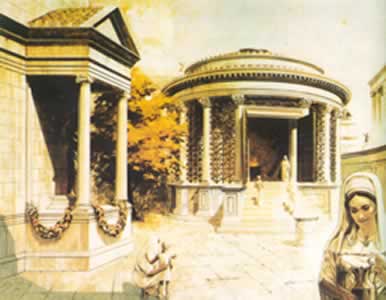
The circular Temple of Vesta- The Ancient City,
Peter Connolly & Hazel Dodge, Oxford Press, p. 172
The priestly office of the College of Vestal Virgins was created by
the second King of Rome. The Vestal Virgins
guarded the Palladium and kept the sacred fire burning. (see
footnote 18)
The Palladium was an image of Pallas Athena
on which the safety of the city depended (see footnote
19),
In Greek & Roman mythology, Odysseus and Diomedes stole the Palladium
from Troy and thus
defeated the city. (see footnote 19)
The College of Vestal Virgins ended in 391 CE, when disbanded by Theodosius
I. (see footnote 18)
Shortly thereafter, in 410 CE- the Visigoths sacked Rome (see footnote
20)
Constantine
defeated Maxentius at Milvan Bridge in 312 CE. The Arch of Constantine
was erected in 315 CE to celebrate this victory. The medallions and
copy on this Arch show Constantine's appreciation of the support of
Athena & Nike in his victory. (see footnote 21) [THIS
IS A NEW FINDING- NOT LISTED ON GOOGLE]
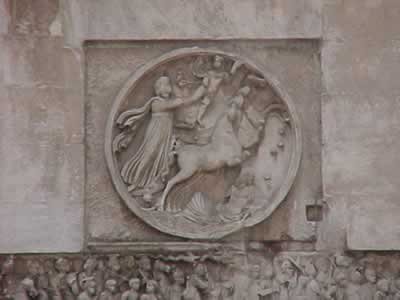
Athena
in chariot with Nike above rising above opposing force. This
medallion appears on Constantine's Arch
directly above scene of Constantine's army leaving Rome to meet Maxentius.
(see footnote 22)
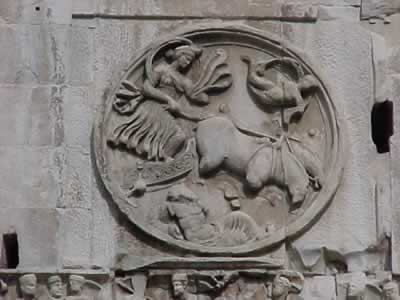
Athena in chariot with Nike above coming down on opposing
force. This medallion appears
directly above scene of Constantine's army after victory entering
Rome in triumph. (see footnote 22)
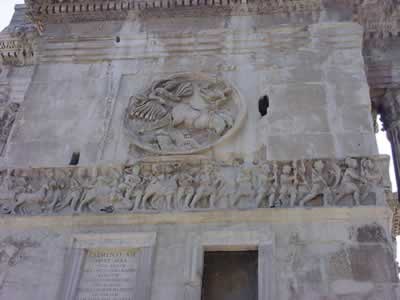
Here is the complete
scene showing Athena & Nike directly above Constantine's
army
entering Rome in triumph, Constantine in his chariot on the left.
(see footnote 23)
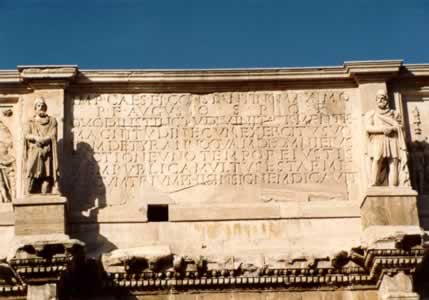
Constantine
honors Athena goddess of wisdom when he states on the arch
(lines 3 & 4 above):
"...quod instinctu
divinitatis mentis magnitudine..."
this translated: "...since
through divine inspiration and great wisdom..."
(for inscription- see footnote 24, translation- see footnote 25)
In
330 CE Constantine moved his seat of government from Rome to
Byzantium, later called Constantinople. (see footnote
26)
Constantine the Great.erected the first church of Hagia
Sophia (Divine Wisdom) in Byzantium.(see footnote 27)
Few structures remain of Constantine's Byzantium except a huge column
which he erected.(see footnote 28)
This column stands 120 feet high. Constantine topped it with a colossal
bronze statue of Apollo, supposedly the work of Phidias. Underneath
this pillar, Constantine had buried the Palladium
which he had removed from Rome. (see footnote 29)

Constantine's 120 foot column in Constantinople with the Palladium
buried underneath. (see footnote 30)
Constantine
in 325 CE presided over the Council of Nicea. The significant
result of this Council was the adoption of the doctrine of the Trinity.
Christianity used the thinking of Plato to formulate its Trinity
doctrine. (see footnote 31)
As the learned trinitarian historian Mosheim states concerning Origen
and the Platonizing movement 200-250CE:
"A new class of philosophers had grown up in Egypt ...they much
preferred Plato, and embraced most of his dogmas concerning
God, the human soul, and the universe." (see footnote 31)
"The Christian bishops introduced, with but slight alterations,
into the Christian worship, those rites and institutions by which
formerly the Greeks and Romans and others had manifested their piety
and reverence toward their imaginary deities; supposing that the people
would more readily embrace Christianity if they perceived the rites
handed down to them from their fathers still existing unchanged among
the Christians, and saw that Christ and the martyrs were worshipped
in the same manner as formerly their gods were." (see footnote
31)
"There was, accordingly, little difference in these times between
the public worship of the Christians and that of the Greeks and Romans."
(see footnote 31)
"It will be noted ... that the most distinguished "Christian"
teachers of the 4th century looked to Origen and the Platonic
philosophy as their model. Any doctrines therefore - such
as the Trinity - formulated at this time are bound to be more
pagan than Christian." (see footnote 31)
Plato speaks of 3 specific Gods--
We read in Plato's Euthydemus in a dialog between Socrates and Dionysodorus:
"No matter, said Dionysodorus, for you admit that you have
Apollo, Zeus, and Athene.
Certainly, I said.
And they are your Gods, he said.
Yes, I said, my lords and ancestors." (see footnote 32)
Therefore Plato identifies Zeus,
Apollo & Athena as his Trinity.
CONSTANTINE'S TRINITY DOCTRINE INCORPORATED
ATHENA AS THE HOLY SPIRIT
[THIS
IS A NEW FINDING- NOT LISTED ON GOOGLE]
Statement 3
 Early
Christians destroy Athena's statue in the Parthenon in 429 CE
Early
Christians destroy Athena's statue in the Parthenon in 429 CE
Athena installed in her Temple the Parthenon in Athens in 438
BCE, atop the Acropolis. (see footnote 33)
Athena remained enshrined inside the Parthenon until 429 CE (a total
of 867 years), when "The Temple of Goddess Athena (Parthenon)
on the Acropolis of Athens is sacked." (see Footnote 34)
"The Christians, under the emperor Theodosius II, removed
the statue to Byzantium, where it was stripped of its
gold and destroyed without a trace." (see Footnote 35)
Statement 4
 Proclus (412-485 CE) discovers Athena, Goddess of Wisdom
Proclus (412-485 CE) discovers Athena, Goddess of Wisdom
In my internet searches, I uncovered a 5th century philosopher named
PROCLUS (412-485 CE). Born in
Byzantium/Constantinople, Proclus felt the Goddess Athena appeared
to him early in his life, urging him to study
philosophy, and later imploring that he move to Athens. He followed
her urgings, and eventually became the leader of Plato's Academy
in Athens. While at the Academy, Proclus became familiar with the
mysteries of Theurgy (see definition below). When the Goddess
Athena was removed from the Parthenon by the Christians, she appeared
to Proclus and said "they turned me out of my Temple, now I come
to live with you. Since then She lives in our homes and our hearts."
(see footnote 36)
Proclus was a pagan, and his world was under attack by the Christians,
who at this time (314-860 CE ) were in the process of destroying Pagan
Temples, burning all non-Christian books, and killing pagan spiritual
leaders. The Christians under Emperor Theodsius sacked the Parthenon
in 429 CE. (see footnote 37 )
Proclus wrote a poem to Athena imploring Her to save him. (see
footnote 38) His life was clearly in danger. (We note
Proclus died of old age at the Academy in 485 CE--see footnote 36).
What were the mysteries of Theurgy practiced by Proclus? (see
footnote 39)
"Theurgy, from the Greek theourgia, means literally something
like 'actuating the divine' and refers to actions that induce
or bring about the presence of a divine or supernatural being, whether
in an artifact or a person...The practice was commended and followed,
in the third and later centuries, by certain Neoplatonist philosophers
and their disciples." (see footnote 39)
Proclus, who felt himself in communication with Athena, was probably
trying to articulate the phenomenon (shown so clearly by Homer) of
Odysseus being assisted by Athena.
Statement 5
 527-565
CE- CHRISTIAN ROMAN EMPEROR JUSTINIAN
(RULING FROM CONSTANTINOPLE) EMBRACED CLASSICAL GREEK THINKING---he
rebuilt the magnificant church Hagia Sofia (Divine Wisdom) in Constantinople
which was described at the time using thinly veiled references to
Athena.
527-565
CE- CHRISTIAN ROMAN EMPEROR JUSTINIAN
(RULING FROM CONSTANTINOPLE) EMBRACED CLASSICAL GREEK THINKING---he
rebuilt the magnificant church Hagia Sofia (Divine Wisdom) in Constantinople
which was described at the time using thinly veiled references to
Athena.
Click here for supporting documentation
Statement 6
 626
CE- MIRACLE SAVES CONSTANTINOPLE-
626
CE- MIRACLE SAVES CONSTANTINOPLE-
Due to the intercession of the Theotokos (Virgin Mary), the city
is saved. "While the Emperor of Byzantium Heracleios was
on an expedition to fight the aggression of the Persians on their
own grounds, there appeared outside the walls of Constantinople barbaric
hordes, mostly Avars. The siege lasted a few months, and it was apparent
that the outnumbered troops of the Queen City were reaching desperation.
However as history records, the faith of the people worked the impossible.
The Venerable Patriarch Sergius with the Clergy and the Official of
Byzantium Vonos, endlessly marched along the great walls of Constantinople
with an Icon of the Theotokos in hand, and bolstered the faith
of the defenders of freedom. The miracle came soon after. Unexpectedly,
as the chronicler narrates, a great storm with huge tidal waves destroyed
most of the fleet of the enemy, and full retreat ensued.
The faithful of Constantinople spontaneously filled the Church of
the Theotokos at Vlachernae on the Golden Horn, and
with
the Patriarch Sergius officiating, they prayed all night singing praises
to the Virgin Mary without sitting. Hence the title of the
Hymn "Akathistos", in Greek meaning 'not seated'.
The Akathist Hymn to the Theotokos
Kontakion
Unto you, O Theotokos, invincible Champion, your City, in thanksgiving
ascribes the victory for the deliverance
from sufferings. And having your might unassailable, free us from
all dangers, so that we may cry unto you:
Rejoice, O Bride Ever-Virgin.
Rejoice, Vessel of the Wisdom of God. Rejoice, Treasury of His
providence. "
See Footnote 40 for additional details on Akathist Hymn-
Here is Theotokos performing in Athena fashion to
protect Constantinople. In the Akathist Hymn, Theotokos
(Virgin Mary) is described as an "invincible Champion" with
"might unassailable" who saves the city. The Virgin Mary
is assuming Athena's role in protecting the city.
Statement 7
 630
CE- ATHENA'S TEMPLE NAMED AFTER DIVINE WISDOM--
630
CE- ATHENA'S TEMPLE NAMED AFTER DIVINE WISDOM--
"The most important symbol of Greek heathenism, the Parthenon,
was changed in the seventh century into a church for Aghia Sophia,
the divine wisdom..."
(see footnote 41)
This shows beyond any doubt that the Christian
Church linked Divine Wisdom to Athena.
"It is by no means coincidence that the chief temples of Pagan
Athens and Christian Constantinople were both dedicated to Wisdom.
The Parthenon as the shrine of the Goddess Athena, Goddess of Wisdom,
and Justinian's Great Church both showed respect for "Sophia"
which has always been one of the chief traits of the Greek mind."
(see footnote 42)
Statement 8
 1735
CE- ATHENA APPEARS ON GERMAN CATHOLIC CHURCH FRESCO-
1735
CE- ATHENA APPEARS ON GERMAN CATHOLIC CHURCH FRESCO-
Click here for details & to view
fresco-
"The Jesuit description from 1735 in view of the woman in Pallas'
golden armour... She is identified as Pallas by her armour
and helmet. Pallas is the goddess of Wisdom, Mary as the seat
of Wisdom is also in this respect the saintly Pallas. Pallas and
Minerva were, in antiquity and the baroque period, quite often identified
with one another. Minerva also represents Wisdom, but also faith,
justice, innocence, grace, and devotion to Mary..."
This shows that the Catholic Church linked Athena
to Divine Wisdom..
The
Return of Athena--- reclaiming our universal protectress
FOOTNOTES:
Footnote 1
http://www.perseus.tufts.edu/cl135/Students/Colin_Delaney/fathena.html
Footnote 2 for Athena statue replica Nashville
http://www.nashville.gov/parthenon/athena.htm
Footnote 3 for Nashville Parthenon replica
http://www.nashville.gov/parthenon/index.htm
Footnote 4
http://www.goddess-athena.org/Museum/Texts/Plato_x.htm
Footnote 5
http://www.goddess-athena.org/Museum/Texts/Odyssey.htm
Footnote 6
http://www.hermes3.net/dec404.htm
Footnote 7
http://bama.ua.edu/~ksummers/cl222/LECT2/tsld002.htm
Footnote 8
http://www.goddess-athena.org/Museum/Texts/Plato_x.htm
Footnote 9
http://www.echoedvoices.org/Jul2001/JulyGodMonth.html
Footnote 10
http://www.myriobiblos.gr/texts/english/constantelos_ab.html
Footnote 11 (see Palladium being carried off by Diomedes)
http://www.novabritannia.org/who_is_minerva.htm
Footnote 12 (see para 5)
http://www.bellaonline.com/articles/art8904.asp
Footnote 13 (see Orphic Mysteries)
http://www.geoman.com/jim/ancientmystery.html
Footnote 14
http://spindleworks.com/library/rfaber/aratus.htm
Footnote 15
http://spindleworks.com/library/rfaber/aratus.htm
Footnote 16 (see quote near end)
http://www.theosophical.org/theosophy/books/rebirth/ch6.html
Footnote 17
http://encyclopedia.laborlawtalk.com/Constantine_I_(emperor)
Footnote 18
http://en.wikipedia.org/wiki/Vestal_Virgin
Footnote 19
http://en.wikipedia.org/wiki/Palladium_%28mythology%29
Footnote 20
http://www.musesrealm.net/rome/timeline.html
Fotnote 21
http://www.architectour.com/1.htm
Footnote 22
http://myweb.lmu.edu/fjust/Rome-ArchConst.htm
Footnote 23
http://www.historyforkids.org/learn/romans/art/archconstantine.htm
Footnote 24
Click Footnote 22--same source
Footnote 25
http://sights.seindal.dk/sight/299_Arch_of_Constantine-2.html
Footnote 26
http://www.yasou.org/byzantium/byz.htm
Footnote 27
http://www.sisantours.com/hag_sop.html
Footnote 28
http://www.omhros.gr/Kat/History/Rel/Mos/Istanbul.htm
Footnote 29
http://gd.cnread.net/cnread1/ewjd/g/gibbon/hor/065.htm
Footnote 30
http://www.geocities.com/constantine325ist/early.html
Footnote 31
http://www.antipas.org/books/trinity/trinity1.html
Footnote 32
http://www.gutenberg.org/dirs/etext99/uthyd10.txt
Footnote 33
http://www.goddess-athena.org/Museum/Temples/Parthenon/index.htm
Footnote 34
http://www.wcer.org/members/europe/Greece/persec.htm
Footnote 35 (see modern date: Dec 4th)
http://www.personal.psu.edu/users/w/x/wxk116/RomanCalendar/dec01.htm
Footnote 36 (see The Life of Proclus)
http://www.goddess-athena.org/Encyclopedia/Friends/Proclus/
Footnote 37
http://www.wcer.org/members/europe/Greece/persec.htm
Footnote 38
http://www.heliodromion.gr/e-orfikos_hymnos_athenas.htm
Footnote 39
http://www.granta.demon.co.uk/arsm/jg/hermes.html
Footnote 40
http://home.it.net.au/~jgrapsas/pages/Akathist.htm
Footnote 41 (para 2)
http://monolith.dnsalias.org/~marsares/acro/history/medieval.html
Footnote 42 (see "The Church of St. Sophia")
http://www.greece.org/Romiosini/constple.html
Footnote 43 (see "Literature and the Arts", near bottom)
http://www.greece.org/Romiosini/constple.html
Footnote 44 (see "Literature and the Arts", nearer bottom)
http://www.greece.org/Romiosini/constple.html
Footnote 45
http://86.1911encyclopedia.org/P/PA/PAULUS_SILENTIARIUS_.htm
Footnote 46
http://www.fordham.edu/halsall/source/paulsilent-hagsoph1.html
Footnote 47
http://www.badw.de/old/englweb/eak2.htm
Contact Evan by
email
Evan's
web site on the Holy Spirit - Divine Feminine-









